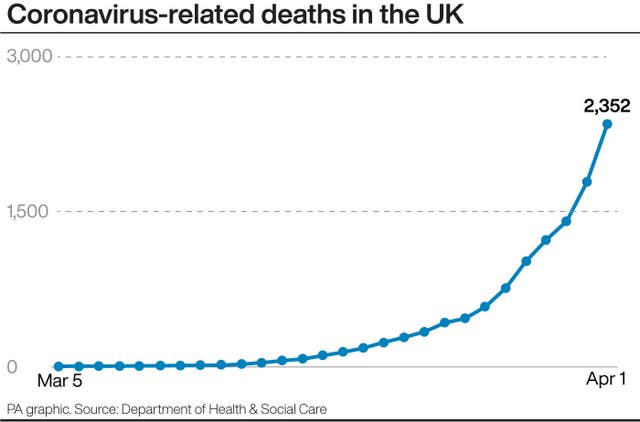Coronavirus patients could have their treatment withdrawn and offered to others who are more likely to survive, new guidance for doctors has warned.
The British Medical Association’s (BMA) latest ethics advice said health professionals could be forced to make “grave decisions” should hospitals become overwhelmed with patients.
The document warns that decisions around rationing scarce resources, such as ventilators, could determine whether large numbers of patients will receive life-saving treatment or not.
It comes as the UK experienced its biggest day-on-day rise in deaths so far, with the government now facing increasing pressure over its Covid-19 testing policy.
Some 2,352 patients have died in hospital after testing positive for the virus as of 5pm on 31 March, the Department of Health said, up by 563 from 1,789 the day before.
Meanwhile, Downing Street said only 2,000 NHS staff, out of 500,000 frontline workers, have so far been tested for coronavirus.
The government has faced intense scrutiny over its Covid-19 testing policy for both NHS workers and the wider public.

The BMA’s new guidance – published on 1 April – aims to ensure doctors have clear and “ethically sound support” should they have to make tough decisions around patient care during the pandemic.
Dr John Chisholm, chairman of the BMA’s medical ethics committee, said: “Looking ahead to the coming weeks, if hard choices are required, we know they will be contested. There will be anger and pain.
“People who, in normal circumstances, would receive strenuous treatment may instead be given palliation in order to favour those with greater likelihood of benefiting.
“Nobody wants to make these decisions, but if resources are overwhelmed, these decisions must be made.”
The BMA’s guidance states that during the peak of the pandemic doctors may have to assess a person’s eligibility for treatment based on a “capacity to benefit quickly” basis.
“Health professionals may be obliged to withdraw treatment from some patients to enable treatment of other patients with a higher survival probability,” the guidance states.
“This may involve withdrawing treatment from an individual who is stable or even improving but whose objective assessment indicates a worse prognosis than another patient who requires the same resource.”
Meanwhile, Professor Yvonne Doyle, medical director of Public Health England (PHE), told a Number 10 daily press briefing that the intention was to “get from thousands to hundreds of thousands” of tests for frontline workers in the coming weeks.
PHE has come under fire over wider testing of members of the public with Covid-19.
It has said repeatedly that most adults who develop symptoms will fully recover and do not need to be tested.
“There is no reason to be complacent. Stay at home, protect the NHS, save lives.” – Dr Yvonne Doyle, Director for Health Protection and Medical Director @PHE_uk gives an update at the #coronavirus press conference.#StayHomeSaveLives pic.twitter.com/hIID00u3Ny
— UK Prime Minister (@10DowningStreet) April 1, 2020
However, many scientists disagree and say it is only through widespread community testing that the UK will be able to track the virus and emerge from lockdown.
Prof Doyle told reporters there was an intention to scale up this sort of testing.
She said: “In terms of mass testing, the testing strategy is to increase the amount of testing done not just in healthcare workers but in the population.

















